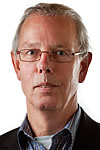Council of Europe wants answers on abuses in Netherlands’ reception of asylum seekers
Council of Europe wants answers on abuses in Netherlands’ reception of asylum seekers
Has the Netherlands not listened to the Council of Europe’s warnings regarding the treatment of asylum seekers in detention centres? This question was put by Andreas Gross and the SP’s Tiny Kox, presidents respectively of the European Social Democrats and the European United Left in the Parliamentary Assembly of the Council of Europe (PACE) to the Committee of Ministers of the pan-European treaty body, which monitors the protection of democracy, the rule of law and human rights in forty-seven member states.
 In 2011 the Council of Europe’s Committee for the Prevention of Torture and Inhuman or Degrading Treatment or Punishment – known as the CPT – issued a warning regarding abuses in Dutch detention centres. The warning followed a visit to such a centre in Rotterdam. At the time of the visit one of the inmates was Alexander Dolmatov, a Russian activist who had applied for political asylum in the Netherlands. According to the CPT, available medical assistance, including psychiatric care, should be broadened. In addition, asylum seekers should be informed in writing and in a language they can understand of the reasons for their detention and the possibilities that exist to appeal against it.
In 2011 the Council of Europe’s Committee for the Prevention of Torture and Inhuman or Degrading Treatment or Punishment – known as the CPT – issued a warning regarding abuses in Dutch detention centres. The warning followed a visit to such a centre in Rotterdam. At the time of the visit one of the inmates was Alexander Dolmatov, a Russian activist who had applied for political asylum in the Netherlands. According to the CPT, available medical assistance, including psychiatric care, should be broadened. In addition, asylum seekers should be informed in writing and in a language they can understand of the reasons for their detention and the possibilities that exist to appeal against it.
Two years on the Dutch government has still not responded to these recommendations from the Council of Europe committee, Alexander Dolmatov is dead, having committed suicide on 17th January, and the Dutch government has recognised that not only was the Russian detained in the centre unjustly, but he was also denied the psychiatric help to which he should have had access following a previous suicide attempt.
As a result of these errors Secretary of State for Asylum Fred Teeven last week faced a no confidence motion in Parliament, which though defeated won support from six opposition parties, including the SP and the Christian Democrats. Voting against the motion were the two governing parties, the centre-right VVD and the Labour Party, supported by the hard right PVV.
On behalf of their respective political groups, Kox and Gross are now asking the Council of Europe Committee of Ministers to give notice to the Dutch government that it is yet to respond to the CPT’s proposals.
